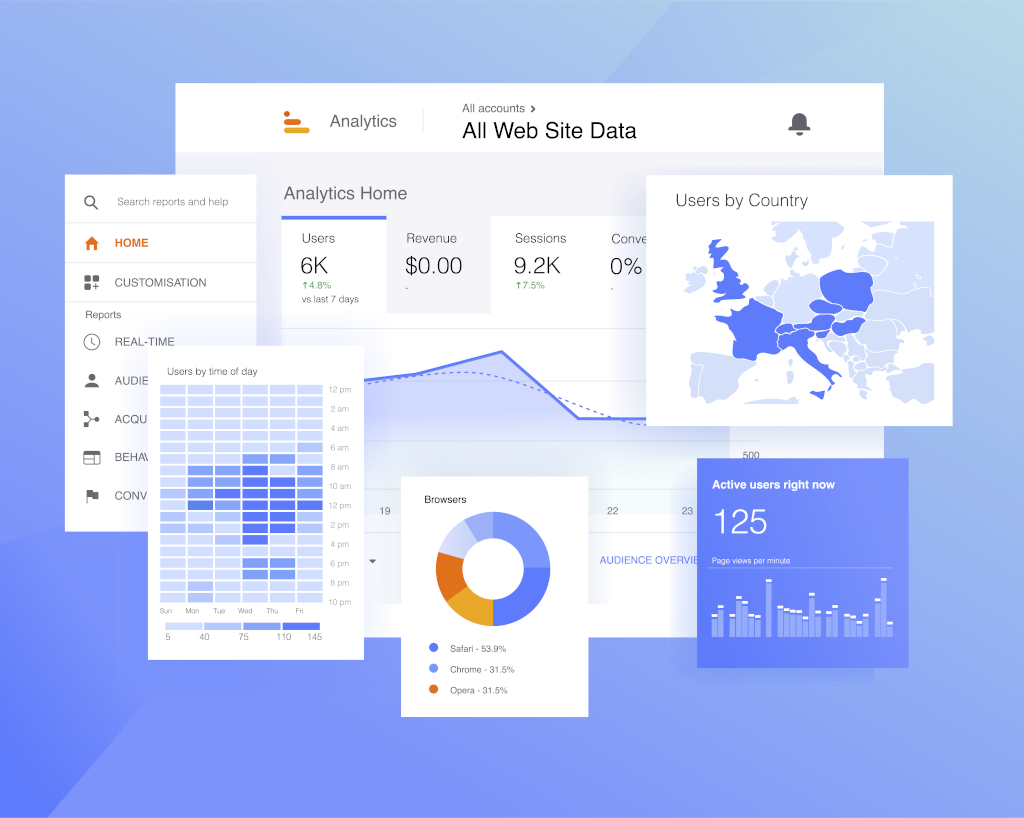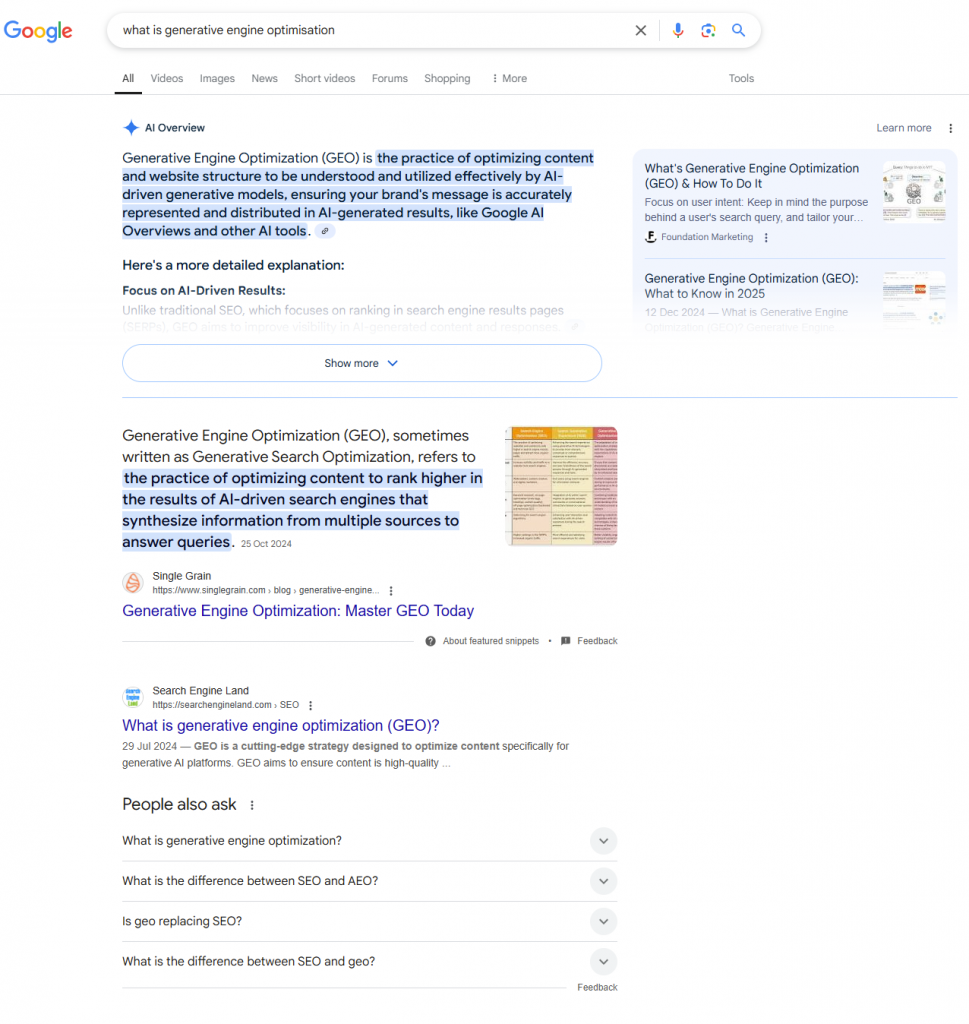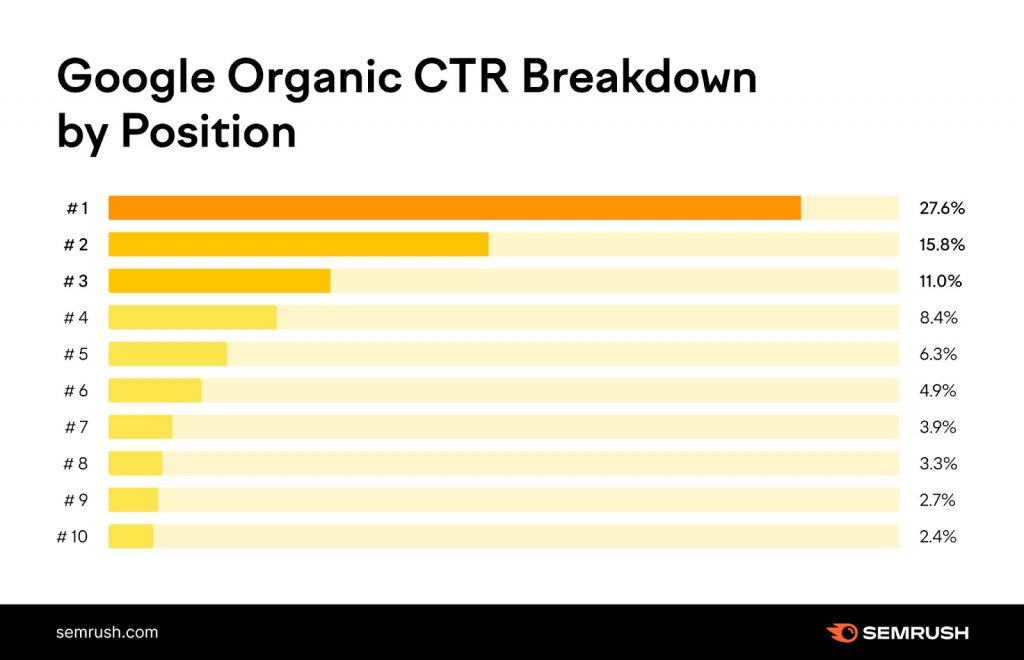Optimising for AI Search
How to rank your law firm in AI search results
Understand ‘Generative Engine Optimisation’ (GEO), find out how it will transform your firm’s digital marketing and learn the strategies you need to put in place in the era of AI-driven search.
This article covers:
- AI and Search Engines
- What does AI Search mean for law firms?
- How is GEO different from SEO?
- How to optimise your law firm’s website for AI search
- Putting AI-SEO into practice

What is AI SEO?
Over the last two years or so, few things have captured as much attention from law firms as AI.
From legal research to document review and analysis, to client interaction and AI- ‘chatbots’, the potential applications of artificial intelligence in a law firm are extensive.
As a digital marketing agency specialising in the legal sector, we are mainly concerned with how AI can be applied to enhance your law firm’s growth – how might AI help us attract and win new business?
This article deals with the impact AI may have on your online marketing – specifically, how might the introduction of AI overviews in search engines impact your website’s traffic and enquiries?

AI & Search Engines
Artificial intelligence and digital marketing now naturally find their confluence in search engines.
Google, Bing, among others are increasingly including AI-generated results at the top of traditional search engine results pages (SERPS).
Google calls this their ‘AI overview’ and place it at the very top of the results page.
This is an AI synthesis of the most relevant results and offers quick, concise answers to the user’s query – see opposite for an example.
At the top, marked with a small blue star, is Google’s AI overview – essentially, their AI is providing an answer to the question “What is generative engine optimisation”?
To the right are links to the sources Google’s AI has used to compile that answer.
Below that, is the “Featured Snippet” which was Google’s previous attempt at providing an immediate answer to the question asked by the user.
Lower still is the first Organic Result – previously the most sought-after real estate on Google’s results page but now some way down.
Finally, Google includes their People Also Ask section, which includes related questions and links to the answer.
This area is said to be “above the fold” (borrowing newspaper jargon) and is the first thing a web user sees when making a query.
As you can see, only one of these elements belongs to ‘traditional’ SEO and the rest require some additional techniques in order to own this space.
Read on to find out how to appear in the AI Overview.
Search Position and Click-Through Rates
Google has long since know the value of this space – the image opposite shows the exponential nature of clicks by position – with first place bringing in almost twice as many clicks as second, and second being almost 50% greater than third.
In recognition of the value of this space, Google has made use of this space by placing the aforementioned features here.
In the era of AI, Search Engines now prefer to give this position to AI syntheses of information found on websites, rather than the traditional list of links to sources.
The net effect of this has been to push organic search results further down the page and force those interested in generating business online to adapt and implement new tactics.
Appearing highly in generative search is likely to be a key source of new instructions for law firms moving forward. Not only does your information appear at the top of a search page, but it has also been synthesised to directly answer a user’s query – effectively endorsed by the AI engine returning the result.

How is GEO different from SEO?
SEO as a discipline is now over 25 years old. It is a mature and well-established field with a body of knowledge, best practices and an ecosystem of trusted and reliable tools available.
GEO on the other hand, is barely 2 years old and is an early-stage, experimental discipline with no standardised playbook yet.
In the early days of SEO, those involved in the industry had to test, adjust, measure, compare and sift through the noise to find the signal. GEO is, to some extent, at that stage now.
Rather than viewing these as distinct strategies, we at Kee Digital Media view them as integrated and complementary approaches which overlap and combine to form a core part of any modern digital marketing strategy.
For law firms, the core principle is the same – provide useful, valuable information which assists the user in understanding their legal issue and identifying a range of potential solutions.
What is SEO?
- Is designed to rank individual pages.
- Takes a list of resources and ‘ranks’ them in order of relevance using to its algorithm.
- Uses keywords, links and ‘meta data’ to allow search engines to ascertain the relevance, accuracy and trustworthiness of content.
What is GEO?
- Takes information from these resources, synthesises it and returns a more contextually relevant answer to the specific query.
- Focuses on content to provide clear, contextually relevant information that can be parsed and synthesised by AI.
- Returns answers to specific queries.
How to Optimise Your Law Firm’s Website for AI Search
Refine your content strategy
Provide answers to specific legal questions.
A good starting point is the questions that your clients most frequently ask you, but tools such as https://keywordspeopleuse.com/ can help you refine your approach here.
People use AI to solve problems and as such, ask it questions – ensure that your firm’s website answers the questions clients are asking.
Use a conversational tone
AI tools are trained on massive amounts of information and then use this to have conversations with users. People ask AI engines questions in conversational tone and, in truth probably ask questions they would never ask a human for fear of appearing naïve. As an example, the page title “Personal Injury Law Specialists” is likely to be less effective than “Have you been injured in an accident that wasn’t your fault?”
Keep your content legally accurate and up to date.
Regularly sweep for out-of-date information. As AI is synthesising information from multiple sources to compile an answer, having out-of-date tax rates or superseded legislation mentioned on your site is likely to see your site overlooked by AI engines.
Enrich your content
Bring your content to life by adding quantitative data, quotes from reputable sources, explaining technical terms and link out to other sources to allow search engines and users to establish your credibility.
Use EEAT principles
EEAT stands for expertise, experience, authority and trustworthiness.
This means:
- Using detailed staff biographies and having detailed supporting content (expertise)
- Using case studies (experience)
- Using trust icons and linking to and from regulatory bodies and respected publications (authority) and
Having supporting information such as contact details, privacy policies and verified reviews (trustworthiness)
Expand your keyword research
Utilise Holistic Keyword Research
Ensure that your keyword research (and the content you produce) covers:
- Short-tail keywords e.g. “Divorce Lawyers”
- Long-tail keywords e.g. “Redundancy pay calculation UK 2025”
- Conversational searches: (e.g. “what are the legal rights of grandparents to see grandchildren”)
Ensure technical excellence
Keep your website secure and technically excellent to meet the needs of Search engines and Generative engines alike. Optimise for page load speed and mobile friendliness and use structured data (Schema Markup).
Utilise the Data
Keep on top of your site’s Google Analytics and other Analytics tools to ensure that you understand where your traffic is coming from, what people are searching for and how much share of the AI traffic you are getting.
Use AI to Grow Your Firm with Kee Digital Media
Ready to future-proof your law firm’s online presence?
At Kee Digital Media, we specialise in helping law firms take advantage of the evolving world of SEO and Generative Engine Optimisation (GEO).
Whether you’re looking to generate leads from AI-driven search results or enhance your traditional SEO strategy, our expert team has the knowledge and tools to deliver measurable results.
Partner with the specialists in legal sector digital marketing.
Contact Kee Digital Media today to discuss how we can help your firm attract more clients and stay ahead of the competition. Call us now on 0141 478 9090 or click the button below for your free audit.


